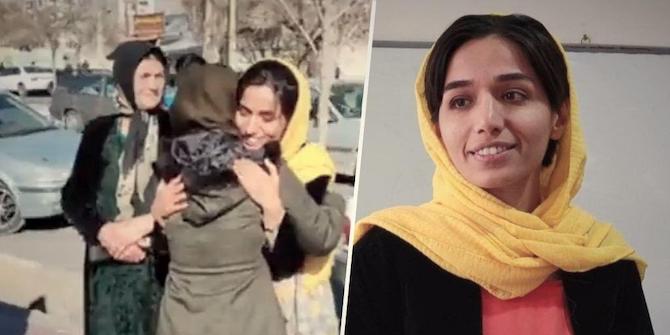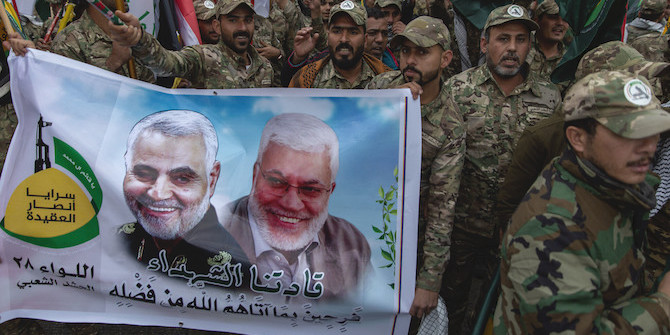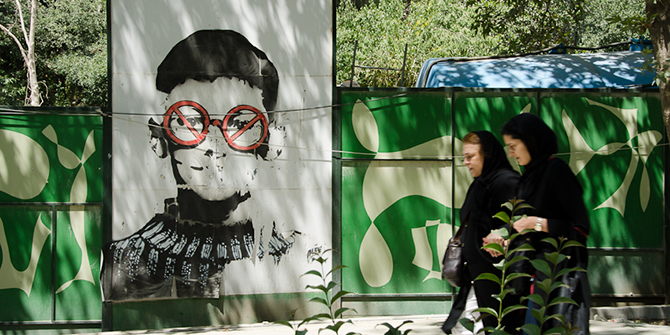by Tan Feng Qin

In two recent speeches, Iranian President Hassan Rouhani pointedly noted how the COVID-19 pandemic has exposed the vulnerability of a world of states used to an international division of labour. In remarks at a cabinet meeting on 29 April, Rouhani praised Iran’s agricultural production. Emphasising the importance of Iranian self-reliance, he remarked that had Iran depended on other countries for its food and medical needs, supplies would have been uncertain. Several days later, at a meeting of Iran’s coronavirus headquarters on 3 May, Rouhani talked of strains in the European Union as member states sought to secure their own supplies of medical goods and personal protective equipment.
He noted that it is Iran’s policy of a ‘resistance economy’, developed even before the coronavirus pandemic at a time of ‘maximum pressure’ from Washington, that has allowed the country to stand on its own feet. The pandemic, President Rouhani said, only showed that Iran was correct to rely upon itself. In saying so, he is aligning himself more firmly with Iranian Supreme Leader Ali Khamenei’s push for increased domestic production and self-sufficiency and his desire to make this year one of a ‘surge’ in production.
As comments about Iran’s economy, these statements should be understood in a larger context. As researcher and analyst Kevjn Lim remarked to me, Iran continues to rely on agricultural imports, as well as imports to sustain its manufacturing industries, oil sector and defence needs. Iran also continues to rely on non-oil exports to its neighbours as a source of foreign currency. The ‘year of boosted production’ is also meant to boost these regional exports.
However, these comments mark a change in tone that could have implications for renegotiating the Joint Comprehensive Plan of Action (JCPOA) nuclear deal. In previous speeches, Rouhani argued for both the necessity of negotiations concurrent with a policy of resistance, as well as the benefits of economic relations with the world for Iran’s domestic development. In February, he highlighted the jump in economic growth enjoyed by Iran in 2016 as a result of Iran’s acceptance of the JCPOA and the attendant lifting of sanctions – Iran’s GDP grew 12.5 percent between March 2016 and March 2017.
In December 2019, the president said in a speech that the easy path was to reject negotiations and chant slogans, but that this would only result in a loss for Iran.
Rouhani has made significant efforts to sell a negotiations process to a domestic audience – even if his administration has ruled out bilateral negotiations with the Trump administration – as an integral means for Iran to return to reaping the JCPOA’s promised economic benefits. And as recently as 23 March President Rouhani argued that Supreme Leader Khamenei’s call for a ‘surge in production’ required investment in Iran and good foreign and trade relations with Iran’s neighbours and friends in the world, conditions not likely to be met with continuing tension with the US, Europe and its Gulf neighbours absent a resolution of the JCPOA issue.
It is likely that Iran’s challenges with combating the pandemic while looking to ensure that economically vulnerable Iranians can make a living will be the central concern for the Rouhani administration in the months to come. The administration may well be content to endure the JCPOA status quo until the American presidential election in November gives a clearer picture of what its options are, though Iran has made it clear that it will respond strongly to an extension of a UN arms embargo set to end in October, or the initiation of UN ‘snap-back’ sanctions, including by possibly leaving the nuclear Non-Proliferation Treaty.
In a recent Chatham House discussion, Nasser Hadian of Tehran University pointed out that advocates of the JCPOA in the Iranian elite and government have had their credibility badly damaged by the Trump administration’s decision to exit the agreement and reinstate sanctions. Observers have also noted that in an atmosphere soured by the assassination of Quds Force commander Qasem Soleimani, a parliamentary election where the reformist-pragmatist coalition suffered a devastating defeat, and a newly elected parliament where the question is which conservative faction will dominate, those who will openly support a renegotiation of the JCPOA in Iran will be few, even among moderates and reformists. President Rouhani’s change in tone should be considered in this context.
In this atmosphere, the best chance for resolving the US-Iran impasse remains a new US administration. A second Trump administration is likely to see continued deadlock between Iran and US officials determined to make Iran concede.
It will be important for a potential Biden administration to be clear-eyed about what can be achieved. The next US presidential term will start on 20 January 2021. Iranian presidential elections in mid-2021, perhaps as early as May, will give only a brief window for talks with President Rouhani, who is term limited. A successor to Rouhani, in a period of political recovery for Iranian conservatives, may well be more intransigent. The terms of any new deal will also have to be approved by Iran’s incoming conservative parliament, and the process will be further complicated if a hardline faction succeeds in establishing its influence within it.
Furthermore, as Tyler Cullis and Trita Parsi have noted, attempts to renegotiate the JCPOA in the wake of the Trump administration’s talk of invoking the deal’s ‘snap-back’ mechanism in bad faith could very well lead to Iranian demands to drop the mechanism entirely. A Biden administration must certainly approach the issue of renegotiation with circumspection about what is possible. Considering that Rouhani administration has called for compensation and an expression of regret, in addition to lifting sanctions, for a return to talks with the US in a multilateral setting, foreign policy advisors to the Biden campaign will have to consider how best to quickly extend an opening to Iran that will both address Iran’s demand for due respect and its desire to avoid negotiating from a position of weakness, as well as prepare for the pushback that the effort will likely face from American conservatives.
Doing so will not be straightforward. Besides existing security concerns, new tensions arising from escalatory incidents in the Gulf closer to the US election may also complicate matters, making a return to the deal ‘as is’ more costly in domestic political terms. And as a recent bi-partisan letter in the US House of Representatives in support of diplomatic efforts to extend the UN arms embargo on Iran also shows, Biden will also have to convince members of his own Democratic Party. An alternative would be to suspend sanctions in exchange for negotiations to adjust the JCPOA. However, a Biden administration must be prepared to consider that the additional terms that President Rouhani and Supreme Leader Khamenei may be willing to accept may be limited. It may well be a Biden administration that will have to engage in some amount of ‘heroic flexibility’, this time.
Translations of the speeches linked above were obtained from BBC Monitoring.







Blackmailing the world to observe Trump’s illegal unilateral sanctions requires not only compensation but a pledge that a future rogue president will be will be made to adhere to multilateral agreements.